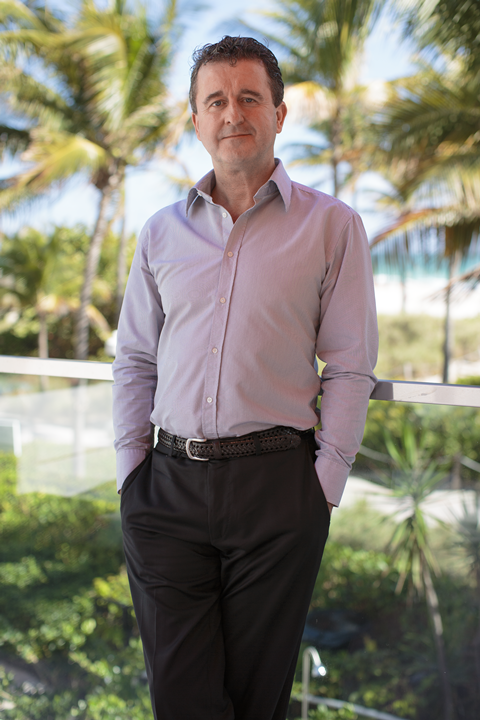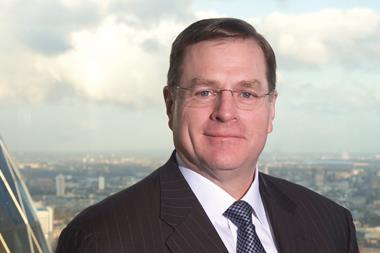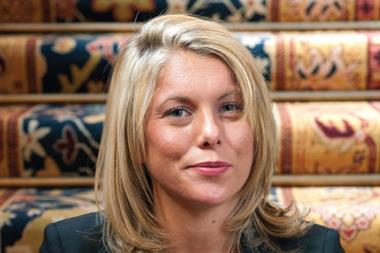Aon’s data and cyber expert Stephen Cross tells StrategicRISK about the firm’s journey into data research and innovation

For a man who spends almost his entire working life travelling, Stephen Cross looks remarkably relaxed as he arrives for StrategicRISK’s photo shoot in Miami Beach.
Despite the venue, it is clear Cross means business and he seems as much at home here as he does in the downtown headquarters of a major global corporation in any big city from London to Singapore.
As chairman, Aon Centre for Innovation and Analytics & Aon Global Risk Consulting, as well as chief executive, Aon GRIP Solutions, not only does Cross have several titles to bear, but he also has a number of offices scattered in various locations around the world.
As a self-confessed data junkie, Cross scours the globe on an almost continual basis in search of satisfying the basic craving that screams relentlessly inside all addicts – his next fix. That means information. Lots of it.
Cross’s life is driven by data and he admits the need to feed his habit constantly. It is essential mental fodder for a human super-computer who, along with his various teams, processes ceaselessly the outcomes of thousands of machines worldwide into something cogent to help businesses understand and determine better their risk strategy.
Aon started what Cross calls the company’s “data journey” in 2008. Underpinning everything was the idea of differentiation and making Aon stand out “in a brokered world that has two basic segments: pure transactional brokerage versus a start-to-finish, end-to-end type of financial risk management house”, says Cross. But what began as an exercise in effect to “see what we could do” has since consumed his life and transformed the business beyond recognition.
“We knew we had all this data on the risk side,” says Cross, “and we looked at the data points we could capture really easily and globally that we could start doing some analytics around. Then we started to think about where this could lead us.”
The early focus on property and casualty, financial lines and marine has now expanded to 51 lines of business. “We are tracking more than 1,200 insurance companies, we have 238 major cities around the world and 169 countries where we underline risks. We have $85trn (€618bn) of limits across all of our books of business and that is capping out your uncapped exposure. Every day millions of dollars of additional information and quotes go into the system and it just keeps growing.”
Cross possesses an encyclopaedic mind that appears to operate most effectively somewhere along the peripheral curve of what is known, while simultaneously assimilating another novel insight for consideration.
Numbers are important, but he is quick to point out that while capturing what is often described as Big Data is “interesting in itself”, it is what you actually do with the information – making sense of it through analysis – that is most important. The seriousness of Aon’s move into data six years ago was signalled by the establishment of an innovation centre in Cross’s home country of Ireland. But it was a challenge finding a technical assessor with the right level of core competence because “nobody had done anything like what we were setting out to do”.
Eventually, Cross discovered what he was looking for in the world of academia – an area into which the company is now firmly embedded, with working relationships embracing such organisations as the renowned Wharton School at the University of Pennsylvania. But it was elsewhere within the Ivy League that Cross turned to first. He hired Dennis McLaughlin, a mathematics professor at Princeton and “an absolute genius”, as Aon’s first chief executive of innovation and analytics. By bringing in an outsider to the insurance world, Cross set the tone for the entire recruitment process. He wanted individuals who were “totally different” and not “contaminated with a history of property, casualty or marine”.
Instead, Aon handpicked like-minded souls from the financial world who specialised in data, in particular in its architecture and structure.
Using Aon’s vast global client pool, the team started to capture information so it could be disseminated, processed and understood – although that was sometimes easier said than done “because Aon is still a product of more than 450 acquisitions over the past 25 years and we hadn’t got all the computer systems linked up”.
No room for error
Purity is also a crucial factor and the company invested in a cleansing facility in Shannon, Ireland, to root out any information errors. “Some of them were glaring and some of them were not,” Cross says.
He soon realised however, that no matter how clean this data was, it was not enough. “We thought that it was interesting but also very backwards-looking,” Cross says. “We wanted to get real-time data so we started to get our brokers aligned with putting in the quotation data in a prescribed format.”
Billing data was broadened to include various other quotes on the same risk. “We thought it would be more useful to know not what the absolutes were but the variables,” Cross says. “We thought that once we built that, we could capture all the broking quotes. We know which markets are quoting which prices for which risks and we could easily analyse and determine that market A is quoting on pharmaceutical liability and at this point market B is here, market C is here – this could be very interesting for our clients because we will actually be able to align our clients’ risk appetite to the markets that are most suited to the risk. So that was the lofty expectation we started out with and that we have since achieved.”
This was not the limit to Cross and Aon’s data ambitions, however, and the team is constantly refining and developing new and more ambitious goals.
Cross is the ultimate deep thinker and his ideas lie at the operational heart of the fastest growing brokerage in the world – a unique and quite extraordinary position within a business that has upwards of 65,000 employees.
As his role gets bigger, so do the numbers and also the possibilities. “We are working on a project with one of our clients where we have 10 million data points,” Cross says. “We are trying to define what the best characteristics would be for an employee in terms of absentee rates and job performance. This group is good at ranking employees and doing appraisals and there are characteristics about how far people live from where they work, how many jobs they have had, what their education is, age experience in the industry group and so on, which means you can identify criteria that are suggestive of who your best employee individuals are, how long they will stay with you and so on. That is hugely helpful to an organisation.”
Preventive measures
Cross says Aon is continually converting data through its analytics into “valuable insights for our clients to probe them around risk to make them think about things that they otherwise would not think of”. In doing so, they are putting the emphasis firmly on prevention rather than cure.
“We are pulling away into preventive and predictive space versus the backwards-looking reactive space,” he says. By adopting a broad yet focused approach, this could even change the entire dynamic of the way in which Aon operates within the broking world.
“We are not where everybody was five or 10 years ago, with people looking at manufacturing risk, financial risk and transportation risk all separately. We now have insight into this as a portfolio of risk – and the diversification of risk that occurs within that portfolio is balanced.
“Underwriters hate it when brokers suggest a price for risk because they think as underwriters they should be dictating this. I see us going as far as understanding and presenting a basket of risk to the market and not just a risk in isolation. It is almost like a mutual fund.”
With so much data, staying compliant across multiple national jurisdictions with differing regulatory practices presents a challenge for the firm. “In Germany, for example, you are not allowed to hold personal data on any database outside the country, so we hold all that information inside Germany,” says Cross.
To limit data concerns Cross says Aon uses only aggregated, unnamed, unexposed data and removes identifiers. “We are unbelievably aware of the compliance requirements we have worldwide. It is expensive but this is where we have advantages over others.”
Compliance regulations change constantly and Cross does have a degree of sympathy and understanding for those who fall foul of them through minor indiscretions.
“It all comes down to intent,” he says. “Why am I seeking this information? Is it for your benefit or to misuse it for my benefit? That is the crux of the question.” Cross believes that data, as well as human capital, is the most valuable asset a business owns. This will increase further in the future when companies will be judged on how much information and insight they possess.
Controlling this is crucial. “We will soon be living in a separated world in terms of data,” says Cross, who firmly believes this is where Aon will hold the advantage.
“We’re in a different place because of what we have in terms of data – and it is an investment.”
CV
After seven years working in the insurance industry in Ireland, Stephen Cross joined International Risk Management Group
(IRMG) based in the Cayman Islands in 1990. He moved to the US in 1995 to develop global sales and marketing for IRMG, which became part of Aon in 2000.
In addition to several risk and insurance-related qualifications, Cross attended the Advanced Management Program at Harvard Business School in 2006.
Previous roles at Aon include responsibility for retail operations in Ireland, the Middle East, Russia and Kazakhstan and chief executive of Aon Global Insurance Managers.
Dealing with the facts
Prediction based on existing facts is part of Cross’s core ethos. There are no surprises in life – just events people don’t want to foresee. No “nonsense” about black swan theories.
Everything is somewhere on the radar – the key is identification. For example, the earthquake and tsunami that triggered the Fukushima disaster were predictable, says Cross.
“I suppose the real question is: is there something out there that we have yet to see that has never happened before and we didn’t envisage it?
“In practical terms, people talked about the volcanic cloud over Iceland but such events happen all the time. There have been many out in Asia and, in 2012, they had to divert around most of the Latin American air corridor because of something that was boiling up over Peru.
“People refer to these as black swan incidents, but I actually cannot think of anything that I would consider a true black swan.
“A power outage for the US? That would just be a much bigger incident than has already happened in Los Angeles or New York.
“If you sit down and think about it you really have to come up with something that is so outlandish to be a black swan.
“From our point of view, as an adviser, we have to help our clients think around what is practically conceivable. And our responsibility has extended in recent times to think about risk constellations; how one can have an impact on another, which can affect another – a domino effect.
“If you have a weak control structure within a company, you are likely to have people behaving badly. They could be harassing employees, they could be fiddling the books, they could be putting out misstatements on social media. By having a weak control environment you have exposed yourself to certain characteristics that could actually bite you from different ends.
“Some risks can open up a lot of avenues of loss, and that is where real enterprise risk lies.”
What are the biggest risks for businesses?
Complacency Out of sight, out of mind. People become really complacent about risks. So how do you take your data and help your clients to not be complacent? People get complacent about compliance, about pricing – it happens all the time. This raises the question as to how we use our data and analytics to make sure our clients are acutely aware of what is important to them and not what the flavour of the day is.
Changing regulation You can be guilty of something that you can do perfectly legitimately today and then somebody decides it was a bad thing and you are tarred. Even if you are not subjected to criminal charges, your reputation can be damaged. That is a risk and really you cannot do much about it.
Getting left behind At Aon, we consider ourselves to be innovators and that others follow us. But in terms of failure to keep up, you don’t even have to be a leader, you can be a follower and still you can continue to fall further behind.



















No comments yet